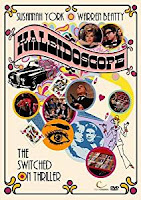After re-watching Bite The Bullet - all I can say is that I was in a very forgiving & generous mood in my 2011 review. This time round, I was struck at how FAKE it is. There's nothing genuine about the movie. The characters are 1970's Hollywood stereotypes, the violence is badly done, the story is boring, and there's not one *real* emotion in the whole damn thing. Somehow Brooks got the reputation as a Western director because of "The Professionals" but there are huge differences between The Professionals and this 2 hours 11 minute piece of crap:
- The Professionals was adopted from a novel - Bite the Bullet was written by Brooks while filming - and it shows.
- The Professionals stars three of the greatest Hollywood Western actors of all time: Lee Marvin, Robert Ryan, and Burt Lancaster. Bite the Bullet has only one true Western star: Ben Johnson in a small role.
- The Professionals is full of action. The group has to "rescue" a kidnapped woman from a Mexican Bandit and fight their way back to the USA. Bite the Bullet isn't. Its about a horse race.
- Bite the Bullet is full of preachy attitudes and phony characters. Bergen is a "You-go-girl feminist", Hackman beats up people for being cruel to animals & doesn't like Guns. Vincent is the opposite: the "Cowboy" villain who likes guns and is cruel to horses! Coburn is fake-tough and tosses off quips like a Beverly Hills screenwriter. Ian Bannen shows up to boost UK Ticket sales, and we get a nice super-cool Mexican who must deal with RACISM.
- Bite the Bullet concern for animal rights is fake. The movie self-righteously bangs the drum endlessly against cruelty to horses. Yet the movie has *real* horses being dropped in a lake, ridden almost till they drop, and tripping over wires. That's reality! And even in the movie, Hackman, "Mr. Animal Rights" almost rides his horse to death in order to reach the finish line.
- The Racing in Bite the Bullet is completely fake. Yes, there were 700 mile horse races in the Old West. But they were marathons. To cover the distance, the horses had to be given plenty of rest, and their riders walked more than they rode. In Bite the Bullet, we RARELY see anyone walking their horse. Instead, the horses are always racing over the roughest terrain, with their rider tall in the saddle. We reach peak stupidity, when Bergen rides in from the Desert, so parched with thirst, she tosses down a galleon of water from a flask. So what about the horse? There aren't any water troughs! And what the hell was the horse drinking while speeding through the Desert!
- The Ending in the Professionals is cool. We get a great quip and a surprise ending. The ending in Bite the Bullet is just plain dumb. After 700 miles, Coburn and Hackman are still neck and neck, and both riders and horses are so exhausted they can barely cover the last 100 yards. So they get off and walk together to the finish line. A good thing the finish line wasn't 100 yards even further, then Hackman/Coburn would've died!











